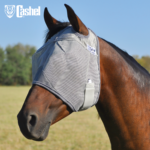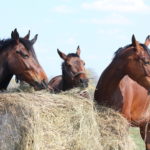I’m up before dawn, because it’ll be a big day here on our 10-acre horse property in Maple Valley, Wash. In a few short hours 50 or more vehicles will come up my driveway full of horse owners eager to learn about the environmental practices of my farm.

This is what I do for a living: As the creator and director of Horses for Clean Water, I teach people how to manage horses in a way that works for them, their animals, their neighborhood and the environment. In other words, I promote ways to manage horses that minimize our impact on the world around us.
Implementing green practices on a horse farm needn?t be difficult or expensive. Many of the topics I teach about are interconnected. For example, controlling water pollution improves the health of nearby streams and rivers, which in turn improves their suitability as wildlife habitat, which increases natural insect predators and decreases your populations of flies and mosquitoes. So, in fact, once you?ve established your new Earth-friendly systems, you may well find that you are saving time and money and doing less work in the long run.
At my open houses, I?ve introduced hundreds of people to environmentally friendly methods of horsekeeping. But I also encourage everyone to get in touch with local conservation districts, extension offices, environmental groups and other resources. A wealth of information is out there for anyone who wants to learn about how these strategies can best be applied in their area. Here’s how you can get started.
Reduce Water Runoff
One of my main topics is nonpoint source pollution–contaminants that reach natural waterways via runoff over land or through the ground. Originating from precipitation as well as irrigation, leaky hoses and other man-made sources, waters that drain through livestock manure have a big impact on streams and wetlands: Sediments cloud the water, nutrients cause unbalanced vegetation growth and bacteria contaminate shellfish beds. Even if you don’t have a stream or pond on your property, tainted runoff can damage local lakes or groundwater.
In our paddocks we use automatic waterers, which use only as much water as our horses can drink. Our insulated, geothermal system helps keep water cool during the summer and prevents freezing in the winter. Another advantage to an automatic waterer is that since water is circulating and not stagnant, it won?t provide habitat for mosquitoes.
Here are other methods for conserving water and reducing the amount of polluted runoff from your farm:
- If the water from your wash stall runs off onto the ground, plant grass or other vegetation to absorb it, filter out contaminants and break down soaps and chemicals.
- Make sure hoses, faucets and sprayer heads don’t leak.
- Pick up manure in high-density turnout areas frequently.
- Follow instructions when applying commercial fertilizers and pesticides, and do not use more than is necessary.
- Plant ?rain gardens,? consisting of native plants clustered in shallow depressions with good drainage, to capture runoff from driveways, downspouts and other areas where water flows after storms.
The U.S. Environmental Protection Agency (EPA) offers fact sheets, management tips and other information on nonpoint source pollution at www.epa.gov/owow/nps. Suggestions for reducing storm-water runoff, such as green roofs and permeable pavements, are described at cfpub.epa.gov/npdes/greeninfrastructure/technology.cfm.
Even a small horsekeeping operation generates tons of manure per year, which if handled improperly can cause problems with odors, flies and runoff.
Some horse owners store manure then spread it on pastures in its raw form. Manure is a good fertilizer, but raw feces may harbor parasite eggs and pathogens, so it’s best not to spread it on fields that horses are grazing.
We promote composting as an excellent manure-management alternative. The breakdown of organic waste by microorganisms in a controlled environment, composting creates a nutrient-rich humus that bears no resemblance to its original ingredients. Although composting requires a little more attention, it offers several advantages over storing and spreading raw manure:
- The heat generated by composting kills most parasite eggs and pathogens.
- Fly populations decline with lost breeding grounds and the death of their eggs and larvae.
- Composting eliminates foul odors and reduces the volume of waste materials you have to move.
- Compost improves the condition and productivity of soil by returning beneficial microorganisms to it, improving its moisture-holding capacity and supplying nitrogen in a form accessible to plants.
If you can’t compost for yourself, consider “outsourcing” the task to the community. Public landfills or commercial topsoil or garden facilities may accept your manure, but some may charge a special handling fee. Local gardeners, organic farmers and landscapers often seek out sources for horse manure: Post a “free manure” notice in a local garden center or on an Internet bulletin board, and you may find people willing to come haul it away.
To continue with this story click to the following pages in our sister site EquiSearch.com.





